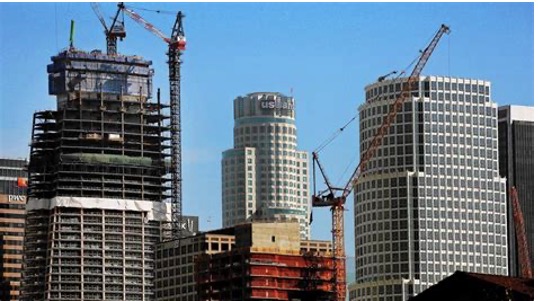CommentsPLANNING WATCH - There are still some fence sitters when it comes to figuring out who City Hall’s puppet masters are.
Neighborhood activists know they routinely run up against large real estate projects with broad City Hall support, especially for the multiple zoning waivers required to legalize these projects. Nevertheless, there are still some holdouts who maintain that the real power behind the throne is not developers, but homeowner groups.
For those who think this is an open question, as someone who worked at City Hall and who now writes about local planning issues in Los Angeles, I will explain why the surviving homeowner groups have extremely limited influence over land use. In contrast, real estate donors and their assorted lobbyists are the real king and queen makers in Los Angeles.
The upcoming November election, however, might bring several new elected officials to City Hall who could challenge this cozy arrangement. In fact, these candidates are already being red-baited for their connections to the Democratic Socialists of America, an electoral party whose proposals range from Reaganomics to traditional US liberalism. The fate of these candidates will help answer the question of who controls city government in Los Angeles.
Test #1 – How will DSA-affiliated elected officials be handled at City Hall? The fate of new Council District 1 Councilmember Eunisses Hernandez, and the possible victories of Kenneth Mejia for City Controller and Hugo Soto-Martínez in Council District 13, will be an excellent test of the power of City Hall’s real estate-centered institutional culture. The last left-liberal non-machine candidate elected to the City Council was Jackie Goldberg in 1993. Once in office, her City Council colleagues cocooned her for eight years. Could the same thing happen to Hernandez and to Meiji and Soto-Martinez if they win in November but don’t quickly line up behind their City Hall colleagues’ support for real estate speculation?
My crystal ball says yes. If they do not carefully walk in the footsteps of archetypal fauxgressive Nythia Raman, another DSA member, they, too, will be cocooned, like Jackie Goldberg. To avoid this outcome, the newcomers only need to keep up their pitter-patter about racial and economic inequality, while supporting two phony solutions: Reaganesque roll backs of zoning regulations and enhanced density bonuses for real estate developers. Even though these programs both increase inequality, the DSA-affiliated electeds only need to stay mum about monitoring the real world consequences of these two give-away schemes.
Test #2 – Will the influence of Neighborhood Councils over land use decisions increase? Despite claims about the supposed political power of resident associations, they are in the same boat as Neighborhood Councils. LA’s 99 Neighborhood Councils represent every neighborhood in the city. They have a small budget allocation from City Hall and their own City agency, the Department of Neighborhood Empowerment. As befits this name, Neighborhood Councils have been empowered to hold hearings on large real estate projects and then submit their advisory opinions to City Hall decision makers. This gives them the subjective feeling of power, but without any objective decision making authority.
Neighborhood Councils can review and render recommendations on major real estate projects, but have no authority to approve or reject them, including the multiple discretionary planning and zoning waivers that these projects require to become legal. When the real decision makers, the Los Angeles City Council, vote on these real estate projects, they can accept or reject the advice of a Neighborhood Council. That is where the buck stops, and the DSA newcomers will be pressured to play ball or face the Jackie Goldberg consequences.
Test #3 -- Will the influence of community groups increase? The general public and local residential organizations get a second chance to weigh in on real estate projects after Neighborhood Council hearings, when the City Planning Commission, the City Council’s Planning and Land Use Committee (PLUM), and the full City Council vote on major real estate projects, almost always approving them. While community groups can submit comment letters and offer a minute of oral testimony, this, like Neighborhood Councils, gives some people the subjective feeling of having power. This feeling is the essence of empowerment, and elected newcomers must decide if they support the City Council’s total monopoly of decision making power over land use.
As a result of the new Los Angeles charter and the creation of Neighborhood Councils, separate homeowner groups and other independent resident organizations barely exist anymore. The Neighborhood Council have, as intended, supplanted them. As a result, only a few independent community groups are still politically active, such as the Sherman Oaks Homeowners Association.

Building boom in downtown Los Angeles
An answer: How effective are Neighborhood Councils, the few surviving HOA’s, other resident groups, and the general public in determining land use decisions in Los Angeles? Will this change when between 1-3 DSA members are sworn into office in January 2023? A look at the online LA development map and online Urbanize LA publication provide the likely answer. DTLA, Miracle Mile, Hollywood, Warner Center, etc. are covered with new, mostly speculative real estate projects. Some have already been completed while other construction projects are under construction or subject to review. The verdict is in. LA is being rebuilt through a building boom of speculative real estate projects, almost all which require City Hall-granted zoning and planning waivers, despite unsuccessful opposition from local residents.
As for the resident organizations that supposedly control this decision making process, a few still issue newsletters and occasionally get a major project to modify some advertising signs or architectural features. In retrospect, their major achievements preceded the new City Charter, when the Los Angeles City Council adopted the General Plan Framework element and most of LA’s Historical Preservation Overlay Zones (HPOZ) and Specific Plans.
Will this situation change if/when several more DSA members take office at City Hall in January 2023? The answer is not likely. Like their predecessor, Nythia Raman, they will quickly figure out how to keep their progressive patina, while supporting City Hall’s green light for real estate speculation.
This is why I say, “Stay tuned!” if you still wonder who controls City Hall.
(Dick Platkin is a former Los Angeles city planner who reports on local planning issues for CityWatchLA. He serves on the boards of United Neighborhoods for Los Angeles (UN4LA) and the Greater Fairfax Residents Association. Previous Planning Watch columns are available at the CityWatchLA archives. Please send comments and corrections to [email protected])
















